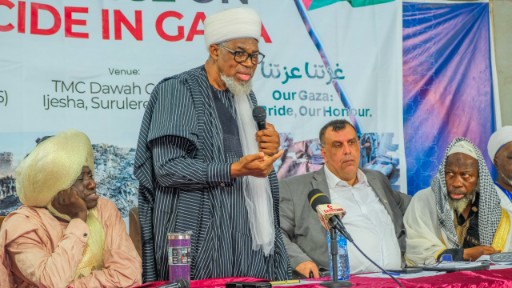Prominent Nigerian Islamic scholars, under the aegis of the Conference of Islamic Organisations (CIO), have strongly condemned the ongoing humanitarian crisis and what they described as the genocidal onslaught against Palestinians in the Gaza Strip by Israeli forces. The religious leaders, led by respected Islamic scholar Sheikh Dhikrullah Shafi’i Ahmad, issued a unified statement denouncing the continued attacks that have led to mass civilian casualties, widespread destruction, and severe deprivation across Gaza.
Speaking during a special press briefing convened in Lagos, the CIO expressed deep concern over what it termed the international community’s deafening silence and inaction in the face of gross human rights violations and the deliberate targeting of non-combatants, including women and children. According to Sheikh Ahmad, the scale of devastation, indiscriminate bombings, and deliberate blockade of humanitarian aid point unmistakably to crimes against humanity that must not go unchallenged.
He emphasised that while political and diplomatic nuances often complicate global responses to Middle East conflicts, there can be no justification for the mass killing of civilians or the systematic obliteration of vital infrastructure such as hospitals, schools, and places of worship. Sheikh Ahmad called on the Nigerian government, African Union, and international human rights organisations to take a more assertive stand in demanding an immediate ceasefire and unimpeded access to medical and humanitarian supplies for the besieged Palestinian population.
Citing reports from global humanitarian bodies, the clerics revealed that thousands of Palestinians, the majority of them innocent civilians, have been killed or maimed since the renewed escalation of hostilities. They added that entire neighbourhoods have been flattened, and basic services such as water, electricity, and healthcare have collapsed under the weight of sustained airstrikes and a prolonged blockade.
The CIO further accused world powers of selective justice and double standards, lamenting the swift global reactions in other conflicts while the Palestinian people continue to suffer decades of occupation, displacement, and apartheid without meaningful intervention. The scholars called on Muslim leaders across the globe to unite in action, not just words, by mobilising resources, diplomatic pressure, and global awareness to end the bloodshed.
In a show of solidarity, the group also offered prayers for the oppressed in Gaza and encouraged Nigerian Muslims and civil society actors to engage in peaceful advocacy, public enlightenment, and humanitarian support. They urged the international media to uphold the principles of unbiased reporting and give voice to the voiceless victims of the Gaza crisis.
The CIO reiterated that their condemnation of the killings is rooted in the Islamic principles of justice, peace, and the sanctity of human life, stressing that silence in the face of oppression is itself an act of complicity. They called for a collective global conscience to prevail, insisting that history will remember those who stood for justice and those who looked the other way.
